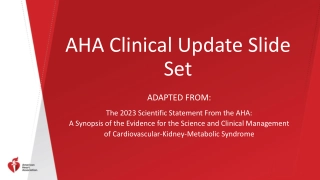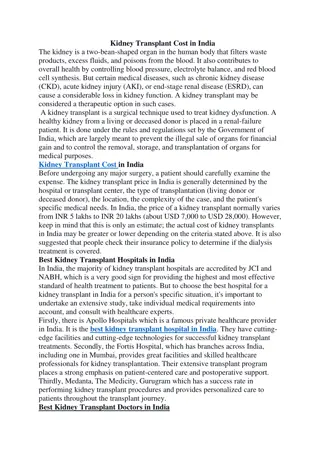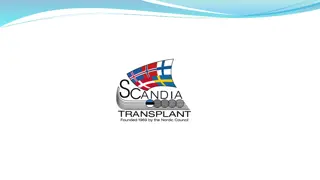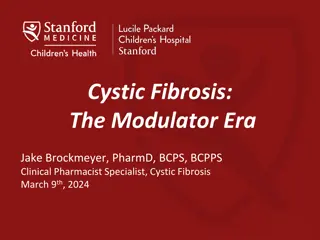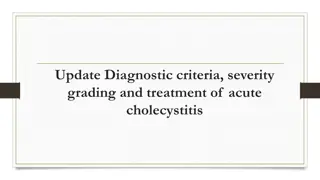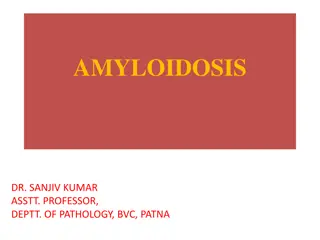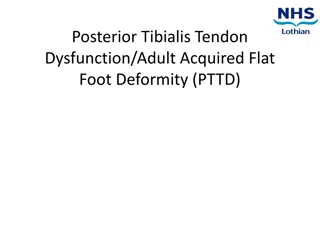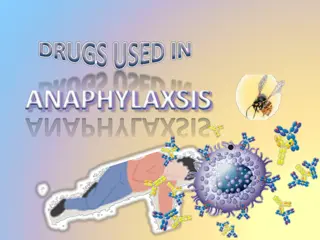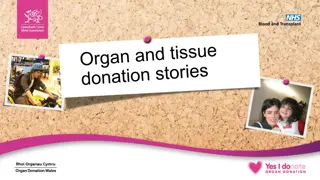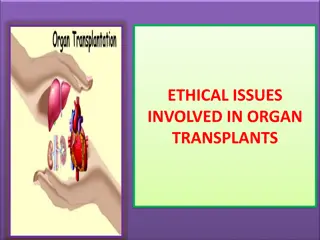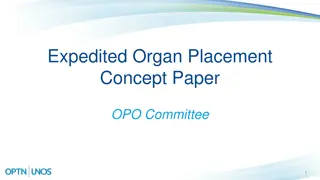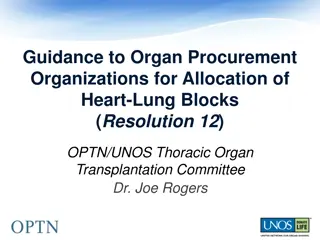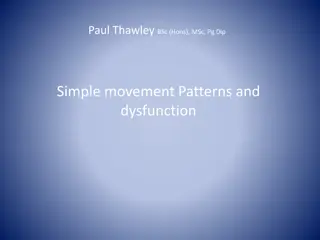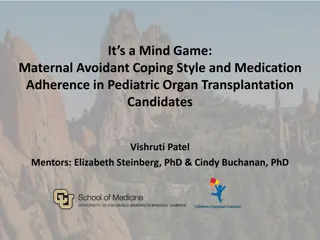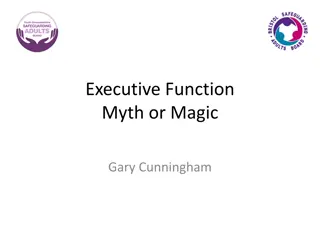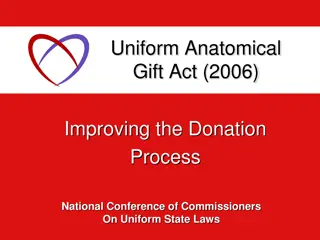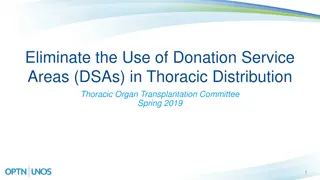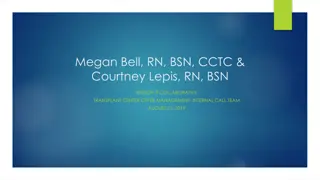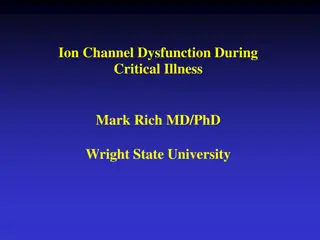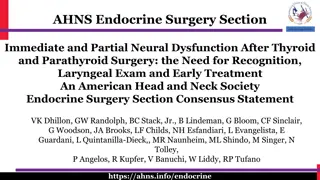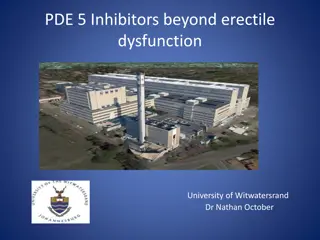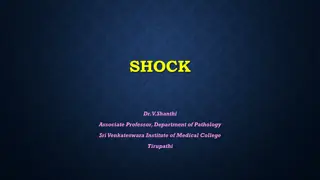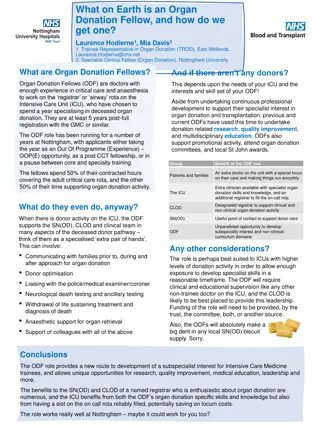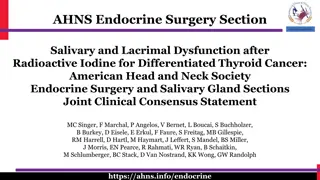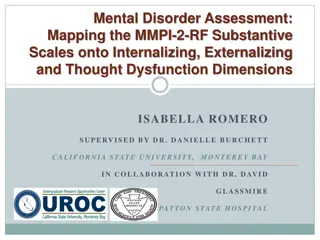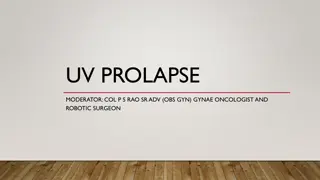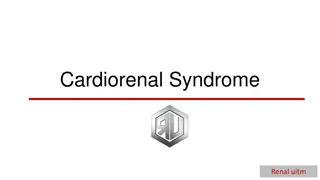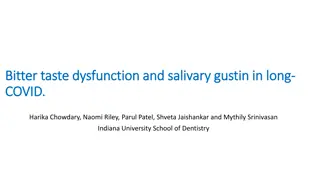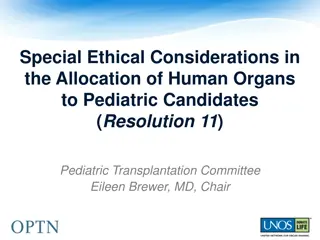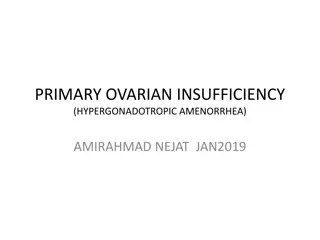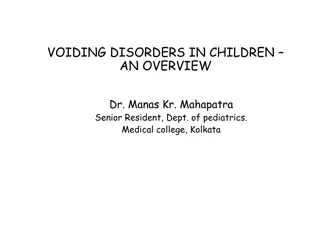AHA Clinical Update Slide Set
The evidence-based science and clinical management of Cardiovascular-Kidney-Metabolic Syndrome (CKM) in this comprehensive slide set. Learn about the pathophysiological interactions, multi-organ dysfunction, and adverse cardiovascular outcomes associated with CKM.
0 views • 14 slides
Understanding Shock: Causes, Symptoms, and Stages
Shock is a critical condition caused by an imbalance between cellular oxygen supply and demand, leading to organ dysfunction. Compensatory responses include increased heart rate, vasoconstriction, and hormonal adjustments. Recognizable features of shock include tachycardia, hypotension, cool clammy
3 views • 27 slides
Understanding Organ Donation in Hong Kong
Explore the various aspects of organ donation in Hong Kong, including suitable organs for donation, living and cadaveric donation processes, low donation rates, common misconceptions, and how to register as an organ donor through the Centralised Organ Donation Register. Discover the opt-in and opt-o
3 views • 28 slides
Kidney Transplant Cost in India
The kidney is a two-bean-shaped organ in the human body that filters waste products, excess fluids, and poisons from the blood. It also contributes to overall health by controlling blood pressure, electrolyte balance, and red blood cell synthesis. But certain medical diseases, such as chronic kidney
10 views • 2 slides
Scandiatransplant Activities and Awards in 2023
Scandiatransplant is the organ exchange organization serving Denmark, Finland, Iceland, Norway, Sweden, and Estonia. They facilitate kidney, liver, thoracic, pancreas, and islet transplantations. The organization aims to maintain transparency and ethical practices while operating a common waiting li
2 views • 45 slides
Cystic Fibrosis:The Modulator Era
Cystic Fibrosis (CF) is a genetic disease caused by variants in the CFTR gene. CFTR is a crucial membrane protein responsible for chloride transport in epithelial cells, impacting organ function. The Modulator Era focuses on CFTR modulators approved by the FDA for treating CF and improving outcomes.
0 views • 63 slides
Overview of Acute Cholecystitis: Diagnosis, Severity Grading, and Treatment
Acute calculous cholecystitis is a common digestive disease with varying treatment perspectives. The Tokyo Guidelines 2018 provide criteria and severity grading for the diagnosis of acute cholecystitis. Diagnosis involves local and systemic signs of inflammation along with specific imaging findings.
0 views • 18 slides
Understanding Amyloidosis: Causes, Types, and Pathological Characteristics
Amyloidosis is a disorder characterized by the deposition of abnormal amyloid fibrils in tissues, impacting various organs. This condition is associated with different types of amyloid, such as AA and AL amyloid. The deposition of amyloid can lead to tissue damage and organ dysfunction. Primary and
1 views • 11 slides
Understanding Posterior Tibialis Tendon Dysfunction (PTTD) in Adults
Posterior Tibialis Tendon Dysfunction, also known as Adult Acquired Flat Foot Deformity (PTTD), is a condition that affects the tibialis posterior tendon, leading to reduced arch support. Common causes include obesity, trauma, age, and existing health conditions. Symptoms may include ankle pain, swe
0 views • 12 slides
Understanding Anaphylaxis: Symptoms, Management, and Classification
Anaphylaxis is a severe allergic reaction that can be life-threatening if not managed promptly. It manifests with symptoms like rash, mucosal swelling, difficulty breathing, and reduced blood pressure. This reaction is classified as anaphylactic shock, a type of shock involving circulatory and organ
0 views • 18 slides
Organ Donation Awareness and Education Activities
Explore the importance of organ donation through engaging activities, such as quizzes on organ and tissue donation facts and myths. Learn about the various organs and tissues that can be donated, the significance of registering on the NHS Organ Donor Register, and the impact of organ donation in sav
1 views • 26 slides
Ethical Issues in Organ Transplants
Organ transplantation involves the moving of organs from one body to another to replace damaged or absent organs. The process includes cadaveric and living organ donations, with various transplantable organs like lungs, kidneys, heart, and more. There are ethical issues surrounding organ donation de
0 views • 16 slides
Understanding Sexual Dysfunction and Associated Factors
Sexual dysfunction encompasses a range of issues that can affect individuals, with causes including psychological, neurological, hormonal, and relationship-related factors. Evaluating sexual problems involves considering duration, context, and frequency. Psychological causes, such as anxiety and str
0 views • 25 slides
Expedited Organ Placement Concept Paper - Addressing Critical Transplant System Issues
This concept paper outlines a proposal to address key challenges in the current organ transplant system, such as lack of transparency and consistency in organ placement. The focus is on developing an expedited placement system with specific triggers and qualifications to improve access to organs for
0 views • 9 slides
Understanding Sacroiliac Joint Dysfunction: A Comprehensive Guide
Discover the intricate anatomy of the spine, learn about the prevalence and causes of lower back pain, delve into the symptoms and diagnosis of sacroiliac joint dysfunction, and explore treatment options to manage this condition effectively.
0 views • 27 slides
National Histopathology Service for Organ Retrieval and Transplantation - Audit Findings
The need for a national histopathology service for organ retrieval and transplantation is highlighted, with a focus on the importance of histopathological analysis in assessing donor organ quality and identifying lesions for further investigation. The audit findings show the incidence of urgent hist
0 views • 17 slides
Enhancing Heart-Lung Allocation Policy for Organ Transplantation
This project focuses on improving the allocation of heart-lung blocks for organ transplantation by providing clear guidelines to Organ Procurement Organizations (OPOs). The goal is to ensure consistent practices among OPOs across the country, promoting fairness and efficiency in organ allocation. Th
0 views • 11 slides
Understanding Movement Dysfunction in Sports Medicine
Movement dysfunction in sports medicine can stem from various factors such as structural instability, loss of range of motion, functional rigidity, poor balance, and more. Clinical movement analysis plays a vital role in identifying muscle imbalances and guiding exercise interventions to enhance ath
0 views • 21 slides
Understanding Maternal Avoidant Coping and Medication Adherence in Pediatric Organ Transplant Candidates
Maternal avoidant coping styles may impact medication adherence in pediatric organ transplantation candidates. Challenges in the field include organ shortage, patient non-adherence, and identifying health risk factors for effective organ allocation. Parents' coping behavior factors of stress include
0 views • 14 slides
Understanding Executive Functioning and Executive Dysfunction
Executive Functioning is a key aspect of cognitive function, encompassing various abilities such as planning, self-awareness, and emotion regulation. Executive Dysfunction, often resulting from frontal lobe injuries, can lead to difficulties in decision-making, social interactions, and learning. Thi
1 views • 21 slides
Modernizing Organ Donation Laws: The Uniform Anatomical Gift Act of 2006
The Uniform Anatomical Gift Act (UAGA) of 2006 aims to enhance the donation process by introducing new definitions, emphasizing personal autonomy, and providing clearer rules. It addresses the need for uniformity, updates to reflect current practices, and modernizes the Act to ensure a smoother orga
0 views • 14 slides
Bringing Life Through Organ Donation: Two-Week Action Plan
Over the next two weeks, the Gift of Life aims to refocus on connecting with palliative care teams, educate ICU staff on the importance of early referrals, raise awareness in the Caribbean community about organ donation, coordinate information sessions with OPO liaisons, and encourage colleagues to
0 views • 64 slides
Proposal to Remove Donation Service Areas in Thoracic Organ Transplantation
The proposal aims to ensure compliance with regulations by eliminating Donation Service Areas (DSAs) in thoracic organ allocation policies. The suggested solutions involve replacing DSAs with a 250 NM distance from the donor hospital, removing language allowing prioritization of sensitize heart cand
0 views • 10 slides
Organ Offer Management at Keck USC Transplant Institute
Keck USC Transplant Institute is a multi-organ transplant center with a dedicated team managing organ offers. The team structure includes RN-Transplant Coordinators, Call Team Managers, and Donor Allocation Specialists. They handle a range of tasks from reviewing offers with physicians/surgeons to p
0 views • 18 slides
Understanding Ion Channel Dysfunction in Critical Illness
An intriguing case study presents a young male with weakness and coma in the ICU following pneumonia and sepsis. Nerve conduction results indicated critical illness myopathy and polyneuropathy, along with cardiac abnormalities. Reduced muscle excitability was attributed to a sodium channelopathy. Th
0 views • 14 slides
Understanding Vocal Fold Paralysis and Neural Dysfunction After Thyroid and Parathyroid Surgery
This consensus statement by the American Head and Neck Society Endocrine Surgery Section highlights the importance of recognizing immediate vocal fold paralysis (VFP) and partial neural dysfunction (PND) following thyroid and parathyroid surgery. The report emphasizes the need for early identificati
0 views • 17 slides
Addressing Cognitive Dysfunction in Patients with Cancer: Causes, Impact, and Treatment
Understanding cognitive dysfunction in cancer patients is crucial for improving quality of life and medical outcomes. This article explores the background, causes, screening, diagnosis, and treatment options for cancer-related cognitive impairment, emphasizing the historical perspective, prevalence,
0 views • 60 slides
Organ Donation and Transplantation Myths True or False
Explore common myths and facts about organ donation and transplantation through a fun true or false game. Learn the truth behind misconceptions like who can be a donor, the possibility of brain transplants, where to register as a donor, fairness in organ allocation, and the impact on funeral arrange
1 views • 14 slides
Cell Biology Overview and Organ Systems in Biology Paper 1
The Biology Paper 1 content covers topics such as cell specializations, cell division, organelles, enzyme functions, and organ systems including the cardiovascular system. It discusses key concepts like stem cells, mitosis, diffusion, osmosis, active transport, and various cell components such as nu
0 views • 8 slides
Exploring the Diverse Applications of PDE-5 Inhibitors Beyond Erectile Dysfunction
Discover how PDE-5 inhibitors go beyond treating erectile dysfunction, with approved and emerging compounds, alternative dose regimens, concentration sites, and potential targets like cardiovascular diseases and the central nervous system.
0 views • 47 slides
Understanding Shock: Types, Mechanisms, and Pathophysiology
Shock, a state of systemic hypotension resulting in impaired tissue perfusion and cellular hypoxia, has various types such as cardiogenic, hypovolemic, septic, neurogenic, and anaphylactic shock. Each type has different mechanisms and causes, leading to decreased cardiac output and multiorgan failur
0 views • 45 slides
Understanding the Role of Organ Donation Fellows in Intensive Care Units
Organ Donation Fellows (ODFs) are experienced doctors specializing in deceased organ donation, spending time on the ICU rota and supporting organ donation activities. They assist in donor optimization, communication with families, and organ retrieval, benefiting both ICU patients and the healthcare
0 views • 4 slides
Salivary and Lacrimal Dysfunction after Radioactive Iodine Treatment
Radioactive iodine (RAI) is commonly used in treating differentiated thyroid cancer but can lead to salivary and lacrimal dysfunction. This joint clinical consensus statement by the American Head and Neck Society Endocrine Surgery and Salivary Gland Sections highlights the importance of understandin
0 views • 20 slides
Understanding the MMPI-2-RF Substantive Scales for Mental Disorder Assessment
This research explores mapping the MMPI-2-RF substantive scales onto internalizing, externalizing, and thought dysfunction dimensions in mental health assessment. The study emphasizes the importance of validating assessments for accurate clinical pictures and effective treatment planning. It delves
0 views • 17 slides
Understanding Pelvic Floor Dysfunction and Prolapse in Women
Pelvic floor dysfunction and prolapse are common issues affecting women, impacting their physical and emotional well-being. Surgical treatment may be necessary for symptomatic cases, but a thorough evaluation of symptoms, obstetric history, and other factors is crucial. Addressing precipitating fact
0 views • 72 slides
Understanding Cardiorenal Syndrome: A Complex Relationship Between the Heart and Kidneys
Cardiorenal Syndrome is a condition where dysfunction in one organ, whether acute or chronic, can lead to dysfunction in the other. This complex relationship involves intricate communication pathways between the heart and kidneys, impacting hemodynamic stability, organ perfusion, and neurohormonal i
0 views • 15 slides
Salivary Gustin and Taste Dysfunction in Long-COVID Patients
The research explores the association between taste perception and the duration of COVID infection in long-COVID and COVID-reinfection cases. Reduced salivary gustin levels correlated with lower taste scores in long-COVID patients. The study also found an increase in the bitter taste receptor gene e
0 views • 4 slides
Ethical Considerations in Pediatric Organ Allocation
Addressing the lack of an ethical framework for pediatric organ allocation, this project aims to provide evidence-based support for prioritizing pediatric candidates. By collaborating with experts and committees, the goal is to establish a permanent framework that respects ethical and clinical judgm
0 views • 11 slides
Understanding Primary Ovarian Insufficiency: Definition, Pathophysiology, Clinical Features
Primary ovarian insufficiency, also known as hypergonadotropic amenorrhea, is a condition characterized by ovarian dysfunction in women under 40. It involves oligo/amenorrhea, elevated FSH levels, and impacts fertility and overall health. The pathophysiology includes follicle depletion and dysfuncti
0 views • 46 slides
Understanding Voiding Disorders in Children: An Overview by Dr. Manas Kr. Mahapatra
Voiding disorders in children, also known as bladder dysfunction, are a common issue affecting up to 40% of pediatric urology clinic visits. These disorders can indicate underlying pathophysiology requiring treatment to prevent renal or urologic damage. The development of urinary control by age 5 is
0 views • 53 slides
